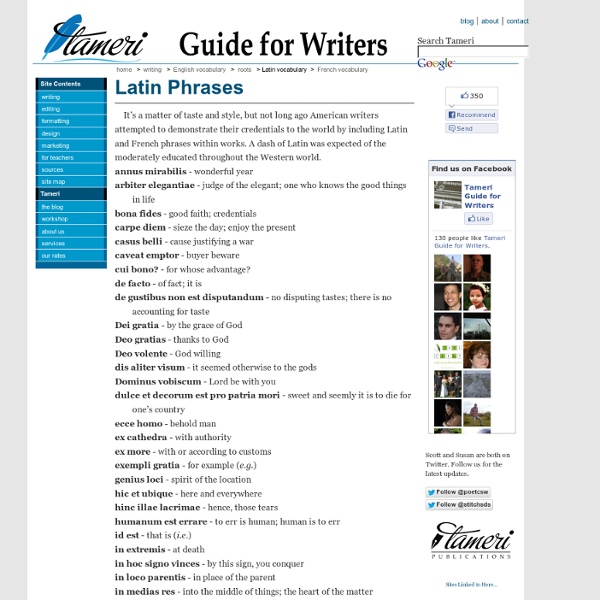Expressions & Sayings Index
If you prefer to go directly to the meaning and origin of a specific expression, click on its relevant entry in the alphabetical list below. Use this alphabet to speed up your search: A B C D E F G H I J K L M N O P Q R S T U V W X Y Z
100 Amazing Web Tools for Hobbyist Scholars
Art & Design A student attending a school of art and design must learn how to communicate ideas through visual language. They study contemporary and classic artists, and learn traditional and modern methods of creating art, covering media like paint, sculpture, textiles, or digital design. With solid foundations in drawing, developed discipline and knowledge, students may pursue a variety of careers in graphic design, product design, conceptual art, illustration, and other fields. Read More About Art & Design Subjects -Select a Subject-
Overcoming the 10 Biggest Obstacles to Creating
By Leo Babauta Every day I struggle with the resistance to writing, and every day I lose the struggle … but then I beat the struggle. I lose more often than I win, but I win every day. And that’s what matters.
CALLIHOO Writing Helps
Character Feelings You can describe your character's feelings in more exact terms than just "happy" or "sad." Check these lists for the exact nuance to describe your character's intensity of feelings. SF Characters | SF Items | SF Descriptors | SF Places | SF EventsSF Jobs/Occupations | Random Emotions | Emotions List | Intensity of Feelings
Displacement, velocity, acceleration
Kinemetics is the description of motion; it concerns only the accurate description of the positions of objects, and the change in their positions. It does not deal with the sources of their motion; we'll discuss dynamics in a few weeks. Displacement is a vector which points from the initial position of an object to its final position. The standard units of displacement are meters. Velocity is a vector which shows the direction and rate of motion. The standard units of velocity are meters per second.
7 Lessons From the World’s Greatest Minds
photo by karlequin Have you ever wished you could go back in time and have a conversation with one of the greatest minds in history? Well, you can’t sorry, they’re dead. Unless of course you’re clairaudient, be my guest.
Why "Start With the Action" Messes Up So Many Writers
By Janice Hardy, @Janice_Hardy If I took a poll for the most common writing advice, “start with the action” would make the list. Which it should, as it’s great advice. But it’s also like “show, don’t tell.”
Questionnaires for Writing Character Profiles - Creative Writing Help
Enter your e-mail to get the e-book for FREE. We'll also keep you informed about interesting website news. "I have searched the web and used different worksheets, but none have come close to your worksheets and descriptions of (what to do and what not to do). Both courses I have taken have with Creative Writing Now have been amazing. Each time I have learned something new.
20 Common Grammar Mistakes That (Almost) Everyone Makes
I’ve edited a monthly magazine for more than six years, and it’s a job that’s come with more frustration than reward. If there’s one thing I am grateful for — and it sure isn’t the pay — it’s that my work has allowed endless time to hone my craft to Louis Skolnick levels of grammar geekery. As someone who slings red ink for a living, let me tell you: grammar is an ultra-micro component in the larger picture; it lies somewhere in the final steps of the editing trail; and as such it’s an overrated quasi-irrelevancy in the creative process, perpetuated into importance primarily by bitter nerds who accumulate tweed jackets and crippling inferiority complexes. But experience has also taught me that readers, for better or worse, will approach your work with a jaundiced eye and an itch to judge. While your grammar shouldn’t be a reflection of your creative powers or writing abilities, let’s face it — it usually is. Who and Whom
Syllables, Scrabble Letters, and Picking Brand Names - Rich Barton
The Completely Ownable, “Made-Up” Consumer Brand Wins Long Term I wrote this as a private email in 2006 and just refreshed for the blog “Should we call our site something literal or should we make up a new word?” This is a question I often get asked by consumer product/service entrepreneurs. In light of Microsoft’s re-launch of Microsoft MSN Live Search as “Bing”, I thought it timely to re-fresh some old thoughts I’ve had about naming, words, and branding. It shouldn’t come as a surprise that I believe it is much more powerful long-term to make up a new word (e.g., Expedia, Zillow, or recently Glassdoor, 3 words that my teams have created) than it is to use a literal word (e.g., Travel.com, RealEstate.com, or Jobreviews.com).



